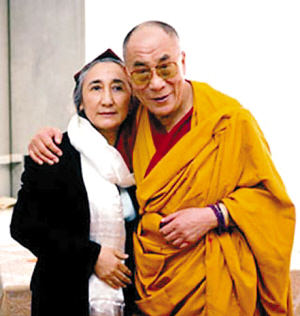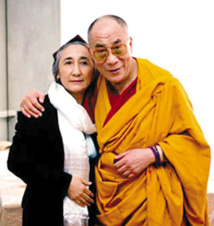Breaking his silence as the summit appeared to be on the point of collapse, South African Nobel peace laureate Desmond Tutu accused his government of "kowtowing" to China and spitting in the face of the late anti-apartheid hero Nelson Mandela.
A group of six laureates, including American anti-landmines activist Williams, decided late last month to boycott the peace summit in Cape Town scheduled for October 13 to 15 because the Tibetan spiritual leader was not being allowed to attend.
The six have accused China of putting political pressure on countries to curb interactions with the Dalai Lama, who has lived in exile in India since fleeing Tibet in 1959 after a failed uprising.
China accuses the 79-year-old of being a separatist, while he says he merely wants more autonomy for Tibet.
Cape Town mayor Patricia de Lille said an announcement on the summit would be made on Thursday.
"We are still in discussion regarding the peace summit and will be making an announcement tomorrow," the mayor's spokesperson told AFP.
There was no immediate comment from the Nobel summit organisation, which is based in Rome.
Williams was among Nobel laureates speaking at a press conference on Wednesday in Dharamsala to mark 25 years since the Dalai Lama was awarded the Nobel peace prize.
- 'They have spat in his face' -
Fellow laureate and Iranian human rights lawyer Shirin Ebadi added: "There is a history of fighting racial discrimination in South Africa and that is why we don't accept this country's refusal to give a visa to the Dalai Lama three times."
Ebadi, one of the original six boycotting the summit, also criticised Tutu for not speaking out about the issue, saying she was "very surprised" at his silence.
The former archbishop, however, later released a statement strongly condemning his government.
"The Nobel Summit in Cape Town, the first to be held on our continent, was meant to celebrate Madiba," Tutu said, using Mandela's clan name. "His own comrades have spat in his face, refusing to see him honoured by the holders of the blue ribbon of awards and honours."
Tutu, who won the Nobel peace prize in 1984, said he was "ashamed to call this lickspitle bunch my government".
Ebadi, who won the Nobel in 2003 for pressing for democracy and human rights in her country, urged the world -- including Chinese people themselves -- to speak out about abuses in China.
"Is it correct not to protest and to take up silence for a government that puts poets in prison?" she asked.
She cited the case of Liu Xiaobo, the Chinese writer and Nobel peace laureate jailed for inciting subversion in 2009.
Liu was awarded the 2010 Nobel while in prison for his "long and non-violent struggle for fundamental human rights in China".
Ebadi also urged countries to oppose China's treatment of its Muslim Uighur minority in the far-western Xinjiang region, which has been hit by deadly violence.
"Countries have to oppose the treatment of the Uighur Muslims in China... also the people in China, when they see these atrocities and keep up silence, they are complicit."
Beijing blames the unrest there on militants seeking independence from China, while rights groups say cultural and religious repression of Uighurs has stoked the violence.
-------------------------------------------------------------------------------------------------------------------------------------
A group of six laureates, including American anti-landmines activist Williams, decided late last month to boycott the peace summit in Cape Town scheduled for October 13 to 15 because the Tibetan spiritual leader was not being allowed to attend.
The six have accused China of putting political pressure on countries to curb interactions with the Dalai Lama, who has lived in exile in India since fleeing Tibet in 1959 after a failed uprising.
China accuses the 79-year-old of being a separatist, while he says he merely wants more autonomy for Tibet.
Cape Town mayor Patricia de Lille said an announcement on the summit would be made on Thursday.
"We are still in discussion regarding the peace summit and will be making an announcement tomorrow," the mayor's spokesperson told AFP.
There was no immediate comment from the Nobel summit organisation, which is based in Rome.
Williams was among Nobel laureates speaking at a press conference on Wednesday in Dharamsala to mark 25 years since the Dalai Lama was awarded the Nobel peace prize.
- 'They have spat in his face' -
Fellow laureate and Iranian human rights lawyer Shirin Ebadi added: "There is a history of fighting racial discrimination in South Africa and that is why we don't accept this country's refusal to give a visa to the Dalai Lama three times."
Ebadi, one of the original six boycotting the summit, also criticised Tutu for not speaking out about the issue, saying she was "very surprised" at his silence.
The former archbishop, however, later released a statement strongly condemning his government.
"The Nobel Summit in Cape Town, the first to be held on our continent, was meant to celebrate Madiba," Tutu said, using Mandela's clan name. "His own comrades have spat in his face, refusing to see him honoured by the holders of the blue ribbon of awards and honours."
Tutu, who won the Nobel peace prize in 1984, said he was "ashamed to call this lickspitle bunch my government".
Ebadi, who won the Nobel in 2003 for pressing for democracy and human rights in her country, urged the world -- including Chinese people themselves -- to speak out about abuses in China.
"Is it correct not to protest and to take up silence for a government that puts poets in prison?" she asked.
She cited the case of Liu Xiaobo, the Chinese writer and Nobel peace laureate jailed for inciting subversion in 2009.
Liu was awarded the 2010 Nobel while in prison for his "long and non-violent struggle for fundamental human rights in China".
Ebadi also urged countries to oppose China's treatment of its Muslim Uighur minority in the far-western Xinjiang region, which has been hit by deadly violence.
"Countries have to oppose the treatment of the Uighur Muslims in China... also the people in China, when they see these atrocities and keep up silence, they are complicit."
Beijing blames the unrest there on militants seeking independence from China, while rights groups say cultural and religious repression of Uighurs has stoked the violence.
-------------------------------------------------------------------------------------------------------------------------------------









 Home
Home Politics
Politics











